人教版八年级上册Unit 1 Where did you go on vacation? Section A Grammar focus -3c 课件 (共44张PPT)
文档属性
| 名称 | 人教版八年级上册Unit 1 Where did you go on vacation? Section A Grammar focus -3c 课件 (共44张PPT) | 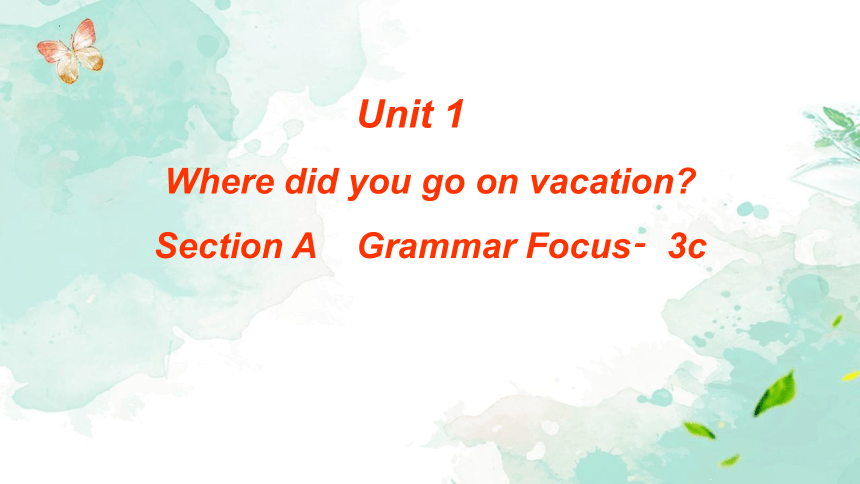 | |
| 格式 | pptx | ||
| 文件大小 | 1.8MB | ||
| 资源类型 | 教案 | ||
| 版本资源 | 人教新目标(Go for it)版 | ||
| 科目 | 英语 | ||
| 更新时间 | 2023-08-05 15:31:48 | ||
图片预览

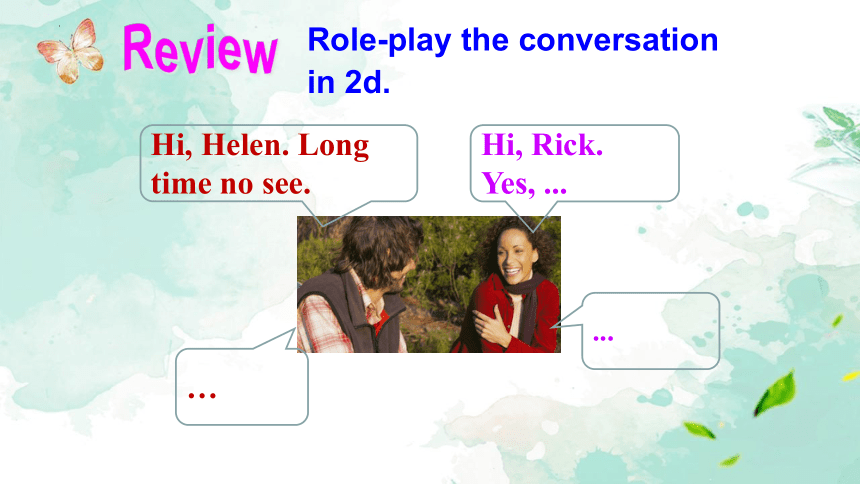
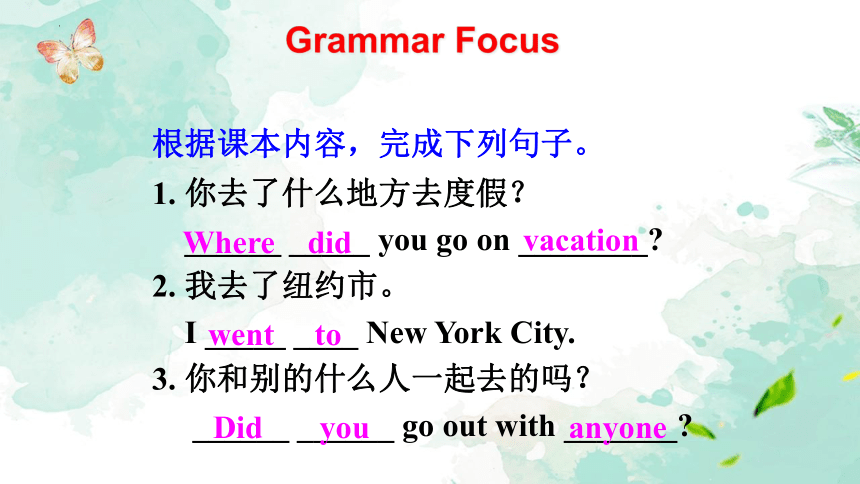
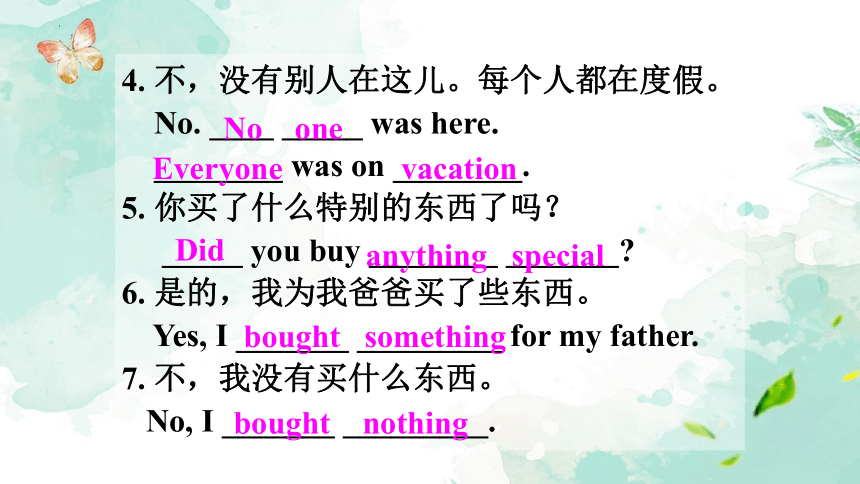
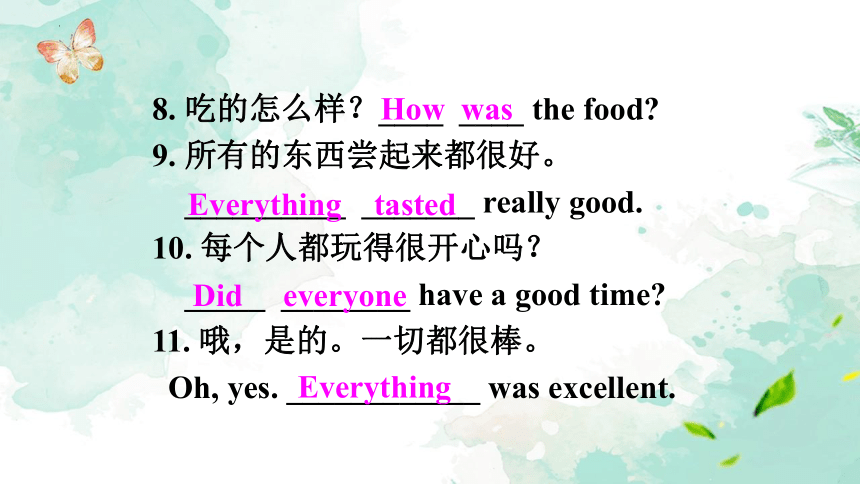
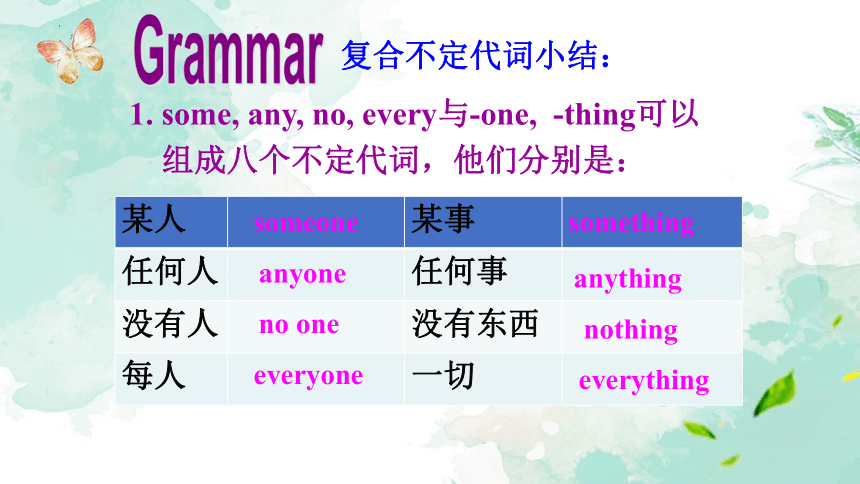
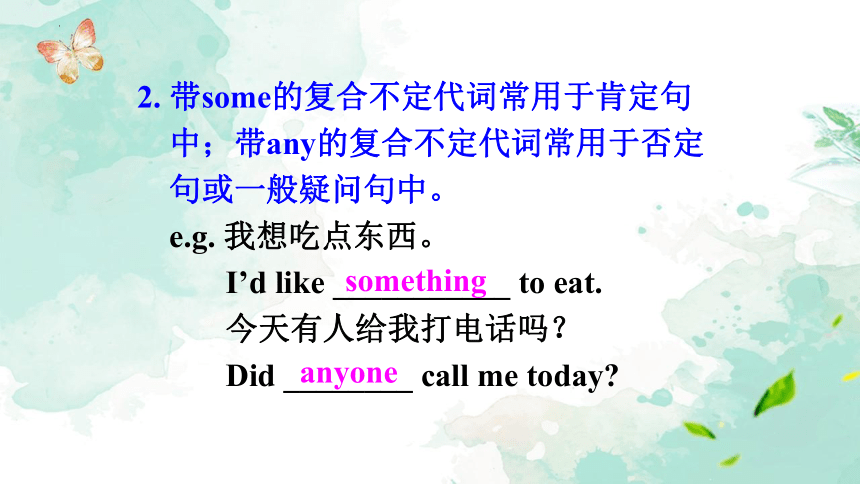
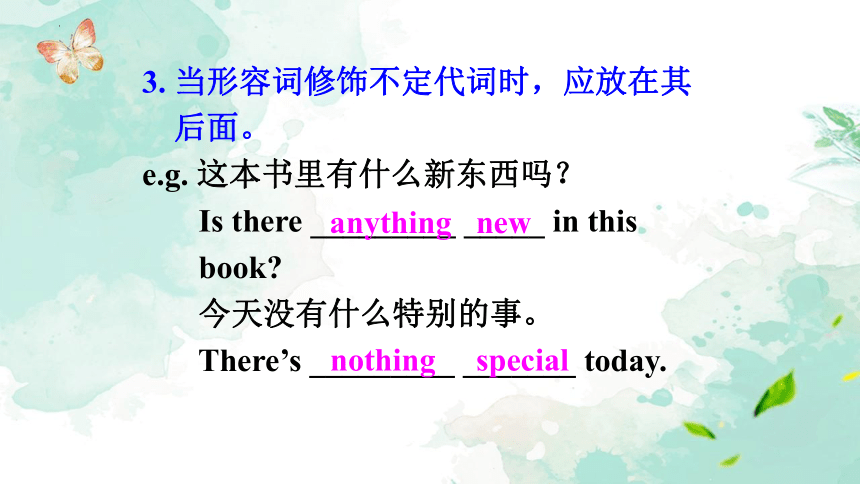
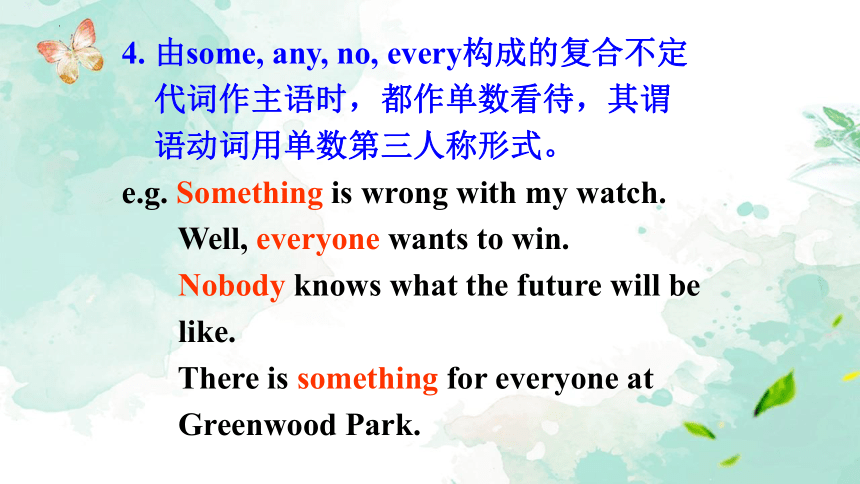
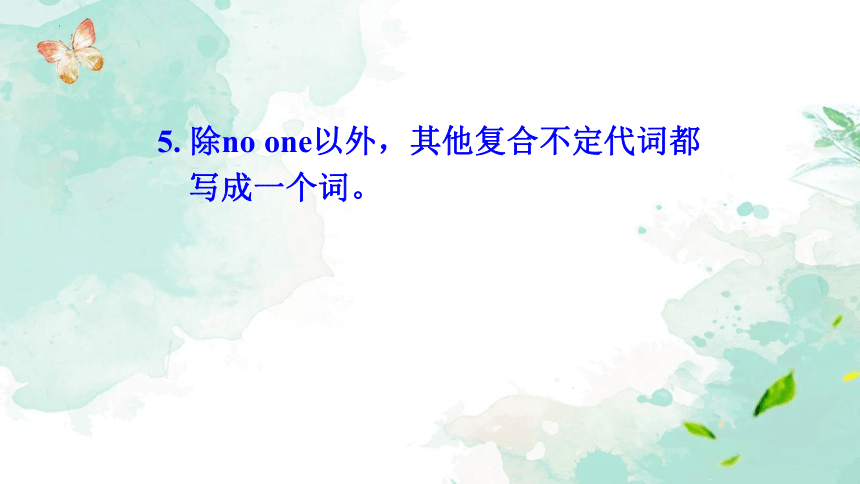
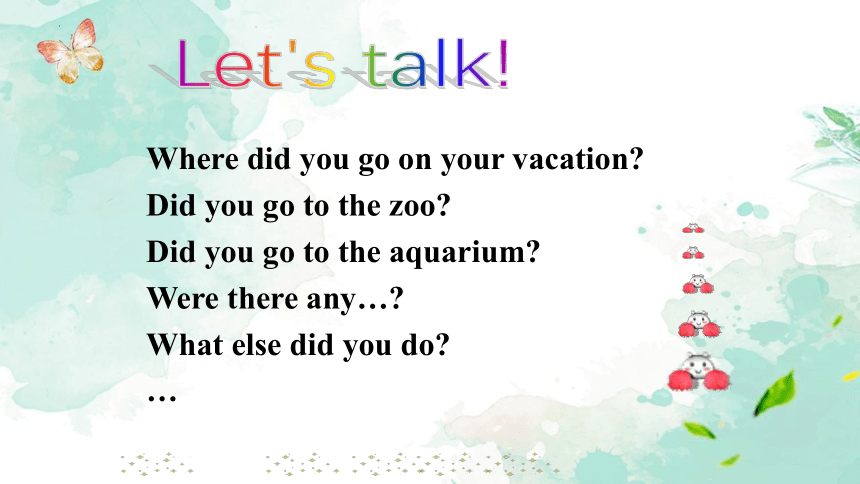
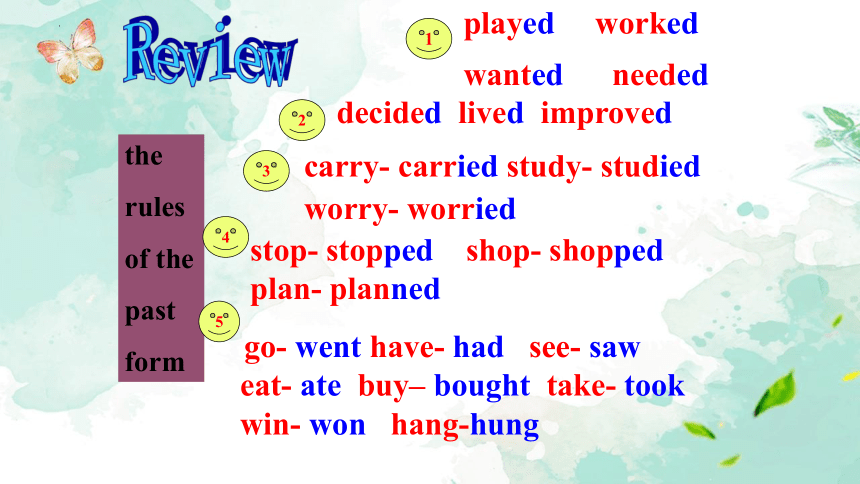
文档简介
(共44张PPT)
Unit 1
Where did you go on vacation
Section A Grammar Focus 3c
Review
Role-play the conversation in 2d.
Hi, Helen. Long time no see.
Hi, Rick. Yes, ...
…
...
1. 你去了什么地方去度假?
______ _____ you go on ________
2. 我去了纽约市。
I _____ ____ New York City.
3. 你和别的什么人一起去的吗?
______ ______ go out with _______
Grammar Focus
vacation
Where did
went to
Did you
anyone
根据课本内容,完成下列句子。
4. 不,没有别人在这儿。每个人都在度假。
No. ____ _____ was here.
________ was on ________.
5. 你买了什么特别的东西了吗?
_____ you buy ________ _______
6. 是的,我为我爸爸买了些东西。
Yes, I _______ _________ for my father.
7. 不,我没有买什么东西。
No, I _______ _________.
No one
Everyone
vacation
anything special
Did
bought something
bought nothing
8. 吃的怎么样?____ ____ the food
9. 所有的东西尝起来都很好。
__________ _______ really good.
10. 每个人都玩得很开心吗?
_____ ________ have a good time
11. 哦,是的。一切都很棒。
Oh, yes. ____________ was excellent.
How was
Everything tasted
Did everyone
Everything
某人 某事
任何人 任何事
没有人 没有东西
每人 一切
Grammar
1. some, any, no, every与-one, -thing可以
组成八个不定代词,他们分别是:
someone
复合不定代词小结:
anyone
no one
everyone
something
anything
nothing
everything
2. 带some的复合不定代词常用于肯定句
中;带any的复合不定代词常用于否定
句或一般疑问句中。
e.g. 我想吃点东西。
I’d like ___________ to eat.
今天有人给我打电话吗?
Did ________ call me today
anyone
something
3. 当形容词修饰不定代词时,应放在其
后面。
e.g. 这本书里有什么新东西吗?
Is there _________ _____ in this
book
今天没有什么特别的事。
There’s _________ _______ today.
anything new
nothing special
4. 由some, any, no, every构成的复合不定
代词作主语时,都作单数看待,其谓
语动词用单数第三人称形式。
e.g. Something is wrong with my watch.
Well, everyone wants to win.
Nobody knows what the future will be
like.
There is something for everyone at
Greenwood Park.
5. 除no one以外,其他复合不定代词都写成一个词。
Let's talk!
Where did you go on your vacation
Did you go to the zoo
Did you go to the aquarium
Were there any…
What else did you do
…
the
rules
of the
past
form
1
played worked
wanted needed
2
decided lived improved
3
carry- carried study- studied
worry- worried
5
go- went have- had see- saw
eat- ate buy– bought take- took win- won hang-hung
4
stop- stopped shop- shopped plan- planned
Review
Objectives
To practice the usage of anyone, someone, everyone, no one, anything, something, everything and nothing
To learn new words: most, something, nothing, everyone, myself, yourself, hen, pig, seem, bored, someone, diary…
Grammar Focus
Where did you go on vacation I went to New York City.
Did you go out with anyone No, no one was here. Everyone was on vacation.
Did you buy anything special Yes, I bought something for
my father./ No, I bought nothing.
How was the food Everything tasted really good!
Did everyone have a good time Oh, yes. Everything was excellent.
3a
Practice
Fill in the blanks with the words in the box and practice the conversation.
anyone, something, anything, everything, nothing
Linda: Did you do _________ fun on your
vacation, Alice
Alice: Yes, I did. I went to Sanya.
Linda: How did you like it
Alice: Well, it was my first time there, so
__________ was really interesting.
Linda: Did you go with ________
Alice: Yes, I did. I went with my sister.
Linda: Did you go shopping
anything
everything
anyone
Alice: Of course! I bought _________
for my parents, but ______ for
myself.
Linda: Why didn’t you buy ________ for
yourself
Alice: I didn’t really see _________ I like.
something
nothing
anything
anything
Explanation
1. myself (我自己) ,yourself (你自己)是反
身代词。表示“某人自己的词”叫反身代
词。见下表:
myself yourself himself herself itself
我自己 你自己 他自己 她自己 它自己
ourselves yourselves themselves 我们自己 你们自己 他们自己 1. Did you buy anything for yourself
你为你自己买什么东西了吗 (做介词宾语)
2. The old man taught himself English.
那位老人自学英语。(做动词宾语)
3. The thing itself is not important.
事情本身并不重要。 (做同位语)
4. I myself visited my aunt last weekend.
上周我自己去拜访了姑姑。 (做同位语)
Practice
anything, everything, nothing, everyone, no one
Fill in the blanks in the e-mail message with the words in the box.
3b
Dear Bill,
How was your vacation Did you do ________ interesting Did _______ in the family go with you I went to a friend’s farm in the countryside with my family. __________ was great. We fed some hens and saw some baby pigs. They were so cute! The only problem was that there was _______ much to do in the evening but read. Still ______ seemed to be bored. Bye for now!
Mark
anything
Everything
everyone
nothing
no one
3c
Ask your group questions about their last vacation. Then tell the class your results.
Did you … Everyone Someone (write classmate’s name) No one
eat anything at a restaurant
read anything interesting
visit anyone in your family
buy anything
keep a diary
Where did … go on vacation
…
stayed at home
Where did … go on vacation
…
went to Sanya
/ the beach
Where did … go on vacation
…
went shopping
Where did … go on vacation
…
went to a friend’s farm
一般过去时
构成
用法
动词的过去式
1. 表示过去某个时间发
生的动作或存在的状态。
2. 表示过去经常或
反复发生的动作。
(the day before) yesterday
last night / week
in 1990 / just now
On Sunday morning
two days ago
一般过去时
常用时间
动词过去式
的构成
规则动词
regular verbs
不规则动词
irregular verbs
1. 动词be的变化:
was
were
am
is
are
2. 助动词do的变化:
do→ did (在过去时里助动词do没有人称和数的变化)
如:Did you play soccer yesterday
Did he play soccer yesterday
3. 实义动词的变化:
实义动词分规则变化和不规则变化。
规则变化有以下几种:
(1) 一般情况下在动词后加-ed。
e.g. play—played visit—visited
walk—walked clean—cleaned
(2) 以不发音的e结尾的词,在词尾加-d。
e.g. note—noted
like—liked
dance—danced
name—named
(3) 以重读闭音节结尾并且词尾只有一个辅音字母,要先双写这个辅音字母,再加-ed。
e.g. stop—stopped
drop—dropped
plan—planned
巧识闭音节:
音节中的元音为 / e /,/ i /,/ a /,/ /,/ u: / 之外的音。例:seem / si m / 开音节 pig / p g / 闭音节
(4) 以辅音字母加y结尾的单词,先改y为i,再加-ed。
e.g. study—studied
carry—carried
(5) 不规则变化需要按一定的规律逐个记忆。
系动词be的过去时.
am (is) →was are →were
陈述句:He was at home yesterday.
否定句:He wasn’t at home yesterday.
疑问句:Was he at home yesterday
Yes, he was./ No, he wasn’t.
句子构成:
行为动词的一般过去时:
陈述句:主语+动词过去式+其他?
否定句:主语+助动词didn’t+动词原形+其他?
I go to the movie. →I went to the movie.
I don’t go to school today. →I didn’t go to school.
特殊疑问句:疑问词+did+主语+动词原形+其他?
一般疑问句:Did +主语+动词原形+其他?
When do you visit the Great Wall
→When did you visit the Great Wall
Do you have breakfast →Did you have breakfast
Yes, I do./ No, I don’t. Yes, I did./No, I didn’t.
Past 过去
Now 现在
go to the movies
do my homework
play tennis
play soccer
clean the room
went to the movies
did my homework
played tennis
played soccer
cleaned the room
1. —Who helped you clean the classroom yesterday
—___. I cleaned it all by myself.
A. Somebody B. Nobody C. Everybody
2. —Can I have some more ice cream, Mum
—Sorry. There is ___left in the fridge.
A. none B. nothing
C. no one D. anything
Exercise
Ⅰ.单项选择
3. Mrs Brown is nice. Every day she tried to cook___ for me during my stay in Canada.
A. something different
B. anything different
C. noting different
4. —Mum, I’m hungry. Is there to eat
—Yes, you can have some bread on the table.
A. something B. nothing C. anything
II.翻译句子
1. 最近每个人都很忙。
2. ——你假期做什么有趣的事了?
——是的。 我去三亚了。
Everyone is very busy these days.
— Did you do anything fun on your
vacation
—Yes, I did. I went to Sanya.
3. 你假期过得怎么样?
How was your vacation
4. 傍晚没有什么事可做,只好看书。
There was nothing much to do in the
evening but read.
5. 我给我父母买了一些礼物,却没给自己
买。
I bought some gifts for my parents, but
nothing for myself.
Summary
不定代词anyone, someone, everyone, no one, anything, something, everything 及 nothing 的用法。
1. Make a survey about what your
friends did on vacation.
3. Preview SectionB (1a-1e).
Homework
Unit 1
Where did you go on vacation
Section A Grammar Focus 3c
Review
Role-play the conversation in 2d.
Hi, Helen. Long time no see.
Hi, Rick. Yes, ...
…
...
1. 你去了什么地方去度假?
______ _____ you go on ________
2. 我去了纽约市。
I _____ ____ New York City.
3. 你和别的什么人一起去的吗?
______ ______ go out with _______
Grammar Focus
vacation
Where did
went to
Did you
anyone
根据课本内容,完成下列句子。
4. 不,没有别人在这儿。每个人都在度假。
No. ____ _____ was here.
________ was on ________.
5. 你买了什么特别的东西了吗?
_____ you buy ________ _______
6. 是的,我为我爸爸买了些东西。
Yes, I _______ _________ for my father.
7. 不,我没有买什么东西。
No, I _______ _________.
No one
Everyone
vacation
anything special
Did
bought something
bought nothing
8. 吃的怎么样?____ ____ the food
9. 所有的东西尝起来都很好。
__________ _______ really good.
10. 每个人都玩得很开心吗?
_____ ________ have a good time
11. 哦,是的。一切都很棒。
Oh, yes. ____________ was excellent.
How was
Everything tasted
Did everyone
Everything
某人 某事
任何人 任何事
没有人 没有东西
每人 一切
Grammar
1. some, any, no, every与-one, -thing可以
组成八个不定代词,他们分别是:
someone
复合不定代词小结:
anyone
no one
everyone
something
anything
nothing
everything
2. 带some的复合不定代词常用于肯定句
中;带any的复合不定代词常用于否定
句或一般疑问句中。
e.g. 我想吃点东西。
I’d like ___________ to eat.
今天有人给我打电话吗?
Did ________ call me today
anyone
something
3. 当形容词修饰不定代词时,应放在其
后面。
e.g. 这本书里有什么新东西吗?
Is there _________ _____ in this
book
今天没有什么特别的事。
There’s _________ _______ today.
anything new
nothing special
4. 由some, any, no, every构成的复合不定
代词作主语时,都作单数看待,其谓
语动词用单数第三人称形式。
e.g. Something is wrong with my watch.
Well, everyone wants to win.
Nobody knows what the future will be
like.
There is something for everyone at
Greenwood Park.
5. 除no one以外,其他复合不定代词都写成一个词。
Let's talk!
Where did you go on your vacation
Did you go to the zoo
Did you go to the aquarium
Were there any…
What else did you do
…
the
rules
of the
past
form
1
played worked
wanted needed
2
decided lived improved
3
carry- carried study- studied
worry- worried
5
go- went have- had see- saw
eat- ate buy– bought take- took win- won hang-hung
4
stop- stopped shop- shopped plan- planned
Review
Objectives
To practice the usage of anyone, someone, everyone, no one, anything, something, everything and nothing
To learn new words: most, something, nothing, everyone, myself, yourself, hen, pig, seem, bored, someone, diary…
Grammar Focus
Where did you go on vacation I went to New York City.
Did you go out with anyone No, no one was here. Everyone was on vacation.
Did you buy anything special Yes, I bought something for
my father./ No, I bought nothing.
How was the food Everything tasted really good!
Did everyone have a good time Oh, yes. Everything was excellent.
3a
Practice
Fill in the blanks with the words in the box and practice the conversation.
anyone, something, anything, everything, nothing
Linda: Did you do _________ fun on your
vacation, Alice
Alice: Yes, I did. I went to Sanya.
Linda: How did you like it
Alice: Well, it was my first time there, so
__________ was really interesting.
Linda: Did you go with ________
Alice: Yes, I did. I went with my sister.
Linda: Did you go shopping
anything
everything
anyone
Alice: Of course! I bought _________
for my parents, but ______ for
myself.
Linda: Why didn’t you buy ________ for
yourself
Alice: I didn’t really see _________ I like.
something
nothing
anything
anything
Explanation
1. myself (我自己) ,yourself (你自己)是反
身代词。表示“某人自己的词”叫反身代
词。见下表:
myself yourself himself herself itself
我自己 你自己 他自己 她自己 它自己
ourselves yourselves themselves 我们自己 你们自己 他们自己 1. Did you buy anything for yourself
你为你自己买什么东西了吗 (做介词宾语)
2. The old man taught himself English.
那位老人自学英语。(做动词宾语)
3. The thing itself is not important.
事情本身并不重要。 (做同位语)
4. I myself visited my aunt last weekend.
上周我自己去拜访了姑姑。 (做同位语)
Practice
anything, everything, nothing, everyone, no one
Fill in the blanks in the e-mail message with the words in the box.
3b
Dear Bill,
How was your vacation Did you do ________ interesting Did _______ in the family go with you I went to a friend’s farm in the countryside with my family. __________ was great. We fed some hens and saw some baby pigs. They were so cute! The only problem was that there was _______ much to do in the evening but read. Still ______ seemed to be bored. Bye for now!
Mark
anything
Everything
everyone
nothing
no one
3c
Ask your group questions about their last vacation. Then tell the class your results.
Did you … Everyone Someone (write classmate’s name) No one
eat anything at a restaurant
read anything interesting
visit anyone in your family
buy anything
keep a diary
Where did … go on vacation
…
stayed at home
Where did … go on vacation
…
went to Sanya
/ the beach
Where did … go on vacation
…
went shopping
Where did … go on vacation
…
went to a friend’s farm
一般过去时
构成
用法
动词的过去式
1. 表示过去某个时间发
生的动作或存在的状态。
2. 表示过去经常或
反复发生的动作。
(the day before) yesterday
last night / week
in 1990 / just now
On Sunday morning
two days ago
一般过去时
常用时间
动词过去式
的构成
规则动词
regular verbs
不规则动词
irregular verbs
1. 动词be的变化:
was
were
am
is
are
2. 助动词do的变化:
do→ did (在过去时里助动词do没有人称和数的变化)
如:Did you play soccer yesterday
Did he play soccer yesterday
3. 实义动词的变化:
实义动词分规则变化和不规则变化。
规则变化有以下几种:
(1) 一般情况下在动词后加-ed。
e.g. play—played visit—visited
walk—walked clean—cleaned
(2) 以不发音的e结尾的词,在词尾加-d。
e.g. note—noted
like—liked
dance—danced
name—named
(3) 以重读闭音节结尾并且词尾只有一个辅音字母,要先双写这个辅音字母,再加-ed。
e.g. stop—stopped
drop—dropped
plan—planned
巧识闭音节:
音节中的元音为 / e /,/ i /,/ a /,/ /,/ u: / 之外的音。例:seem / si m / 开音节 pig / p g / 闭音节
(4) 以辅音字母加y结尾的单词,先改y为i,再加-ed。
e.g. study—studied
carry—carried
(5) 不规则变化需要按一定的规律逐个记忆。
系动词be的过去时.
am (is) →was are →were
陈述句:He was at home yesterday.
否定句:He wasn’t at home yesterday.
疑问句:Was he at home yesterday
Yes, he was./ No, he wasn’t.
句子构成:
行为动词的一般过去时:
陈述句:主语+动词过去式+其他?
否定句:主语+助动词didn’t+动词原形+其他?
I go to the movie. →I went to the movie.
I don’t go to school today. →I didn’t go to school.
特殊疑问句:疑问词+did+主语+动词原形+其他?
一般疑问句:Did +主语+动词原形+其他?
When do you visit the Great Wall
→When did you visit the Great Wall
Do you have breakfast →Did you have breakfast
Yes, I do./ No, I don’t. Yes, I did./No, I didn’t.
Past 过去
Now 现在
go to the movies
do my homework
play tennis
play soccer
clean the room
went to the movies
did my homework
played tennis
played soccer
cleaned the room
1. —Who helped you clean the classroom yesterday
—___. I cleaned it all by myself.
A. Somebody B. Nobody C. Everybody
2. —Can I have some more ice cream, Mum
—Sorry. There is ___left in the fridge.
A. none B. nothing
C. no one D. anything
Exercise
Ⅰ.单项选择
3. Mrs Brown is nice. Every day she tried to cook___ for me during my stay in Canada.
A. something different
B. anything different
C. noting different
4. —Mum, I’m hungry. Is there to eat
—Yes, you can have some bread on the table.
A. something B. nothing C. anything
II.翻译句子
1. 最近每个人都很忙。
2. ——你假期做什么有趣的事了?
——是的。 我去三亚了。
Everyone is very busy these days.
— Did you do anything fun on your
vacation
—Yes, I did. I went to Sanya.
3. 你假期过得怎么样?
How was your vacation
4. 傍晚没有什么事可做,只好看书。
There was nothing much to do in the
evening but read.
5. 我给我父母买了一些礼物,却没给自己
买。
I bought some gifts for my parents, but
nothing for myself.
Summary
不定代词anyone, someone, everyone, no one, anything, something, everything 及 nothing 的用法。
1. Make a survey about what your
friends did on vacation.
3. Preview SectionB (1a-1e).
Homework
同课章节目录
- Unit 1 Where did you go on vacation?
- Section A
- Section B
- Unit 2 How often do you exercise?
- Section A
- Section B
- Unit 3 I'm more outgoing than my sister.
- Section A
- Section B
- Unit 4 What's the best movie theater?
- Section A
- Section B
- Unit 5 Do you want to watch a game show?
- Section A
- Section B
- Unit 6 I'm going to study computer science.
- Section A
- Section B
- Unit 7 Will people have robots?
- Section A
- Section B
- Unit 8 How do you make a banana milk shake?
- Section A
- Section B
- Unit 9 Can you come to my party?
- Section A
- Section B
- Unit 10 If you go to the party, you'll have a grea
- Section A
- Section B
